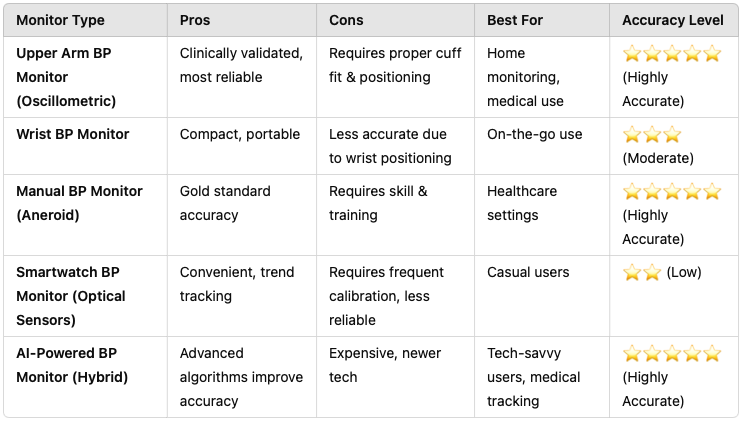How Accurate Are Home Blood Pressure Monitors?
Monitoring blood pressure at home is a key step in managing hypertension, tracking cardiovascular health, and preventing heart disease. However, studies show that up to 30% of home blood pressure monitors may provide inaccurate readings—raising concerns about their reliability.
So, how accurate are home BP monitors? What factors affect accuracy, and how can you ensure your device is giving correct readings?
This guide explores:
✅ How home BP monitors work
✅ Common accuracy issues & how to fix them
✅ Which BP monitors are most reliable
✅ How to check if your BP monitor is accurate
Types of Blood Pressure Monitors: Accuracy & Comparison
Key Takeaway: Upper arm monitors remain the most accurate for home use, while wrist and smartwatch BP monitors have limitations.
How Accurate Are Home Blood Pressure Monitors? (Scientific Findings)
According to a 2023 study in the Journal of Hypertension, 25% of home BP monitors showed deviations of 10 mmHg or more when compared to clinical readings.
American Heart Association (AHA): "Home BP monitors can be highly accurate, but incorrect cuff size and improper technique are common causes of inaccurate readings."
Mayo Clinic: "To ensure accuracy, patients should validate home readings by comparing them with in-office measurements at least once a year."
A 2017 study by the University of Alberta found that over 70% of home BP monitors deviated by at least 5 mmHg due to user error, incorrect positioning, and device inconsistencies.
5 Common Reasons Home BP Monitors Give Inaccurate Readings
1️⃣ Wrong Cuff Size
- Too small = falsely high readings
- Too large = falsely low readings
✔️ Solution: Measure your arm circumference before purchasing a BP monitor.
2️⃣ Incorrect Arm Positioning
- Arm below heart level? ➝ Higher readings
- Arm above heart level? ➝ Lower readings
✔️ Solution: Rest arm on a flat surface at heart level.
3️⃣ Moving or Talking During Measurement
- Talking can increase BP by 10-15 mmHg.
✔️ Solution: Stay silent, sit still, and relax for 5 minutes before measuring.
4️⃣ Measuring at the Wrong Time
- BP fluctuates throughout the day.
✔️ Solution: Take readings at the same time daily (morning & evening).
5️⃣ Not Comparing with a Doctor’s Reading
✔️ Solution: Bring your BP monitor to your next doctor’s visit for a side-by-side check.
Why Some BP Monitors Fail FDA Validation
1️⃣ Lack of Clinical Trials – Many consumer BP monitors skip rigorous validation testing.
2️⃣ Algorithm Errors – Some devices overestimate or underestimate BP due to flawed software.
3️⃣ Population-Specific Bias – Some devices don’t work well for people with darker skin tones or larger arm sizes.
4️⃣ Inconsistencies in Repeated Testing – A BP monitor should produce consistent readings under controlled conditions.
Best Practice: Choose an FDA-cleared & clinically validated BP monitor to ensure accuracy.
Best Home Blood Pressure Monitors (2025)

Key Takeaway: Omron & Welch Allyn offer the most accurate home BP monitors.
Take This 5-Step Test: Is Your BP Monitor Accurate?
✅ Step 1: Compare your BP monitor reading with your doctor’s office measurement.
✅ Step 2: Take three consecutive readings—they should be within 5 mmHg of each other.
✅ Step 3: Measure BP on both arms—there should be less than a 10 mmHg difference.
✅ Step 4: Try another validated BP monitor to cross-check results.
✅ Step 5: Ensure your cuff size is correct for your arm circumference.
If you fail 2 or more steps, your BP monitor may not be accurate!
Real-Life Example: How John Improved His BP Readings
"John, a 55-year-old with hypertension, noticed that his home BP readings were consistently higher than his doctor’s readings. After switching to a correctly sized cuff and using an FDA-cleared monitor, his readings aligned within 3 mmHg of his doctor’s office measurement."
Key Takeaway: Small adjustments can greatly improve BP accuracy.
FAQs: Common Questions About BP Monitor Accuracy
1️⃣ How much can home BP readings differ from doctor’s readings?
- ±5 mmHg is normal, but >10 mmHg may indicate an issue.
2️⃣ Are wrist BP monitors accurate?
- Less accurate than upper arm monitors due to sensitivity to positioning.
3️⃣ Do smartwatches measure blood pressure accurately?
- Not yet—most require cuff calibration & only estimate BP trends.
4️⃣ Can home BP monitors be wrong?
- Yes! User error & poor calibration cause most inaccuracies.
Final Verdict: Are Home Blood Pressure Monitors Accurate?
✔️ Home BP monitors are reliable if clinically validated & used correctly.
✔️ Errors are common due to wrong cuff size, poor positioning, or device issues.
✔️ For the best accuracy, always compare with doctor’s office readings.
Shop FDA-Approved BP Monitors
Browse our collection of clinically validated BP monitors for home & medical use.
References & Sources
- American Heart Association (AHA) – Home Blood Pressure Monitoring Guidelines https://www.heart.org
- Mayo Clinic – Best Practices for Accurate BP Monitoring https://www.mayoclinic.org
- U.S. Food & Drug Administration (FDA) – Blood Pressure Monitor Accuracy Standards https://www.fda.gov
- Journal of Hypertension (2023 Study) – Accuracy of Home vs. Office BP Readings https://www.hypertensionjournal.org
- Harvard Medical School – Why BP Readings Differ & How to Improve Accuracy https://www.health.harvard.edu
Recent Posts
-
How Accurate Are Home Blood Pressure Monitors?
Monitoring blood pressure at home is a key step in managing hypertension, tracking cardiovascul …Feb 19th 2025 -
Can Your Smartwatch Accurately Measure Blood Pressure?
Smartwatches have evolved from simple step counters to advanced health monitoring devices, offe …Feb 19th 2025 -
Manual vs. Electric Hospital Beds: Which One Should You Choose?
When selecting a hospital bed for home care, rehabilitation, or medical facilities, one of the …Feb 19th 2025

